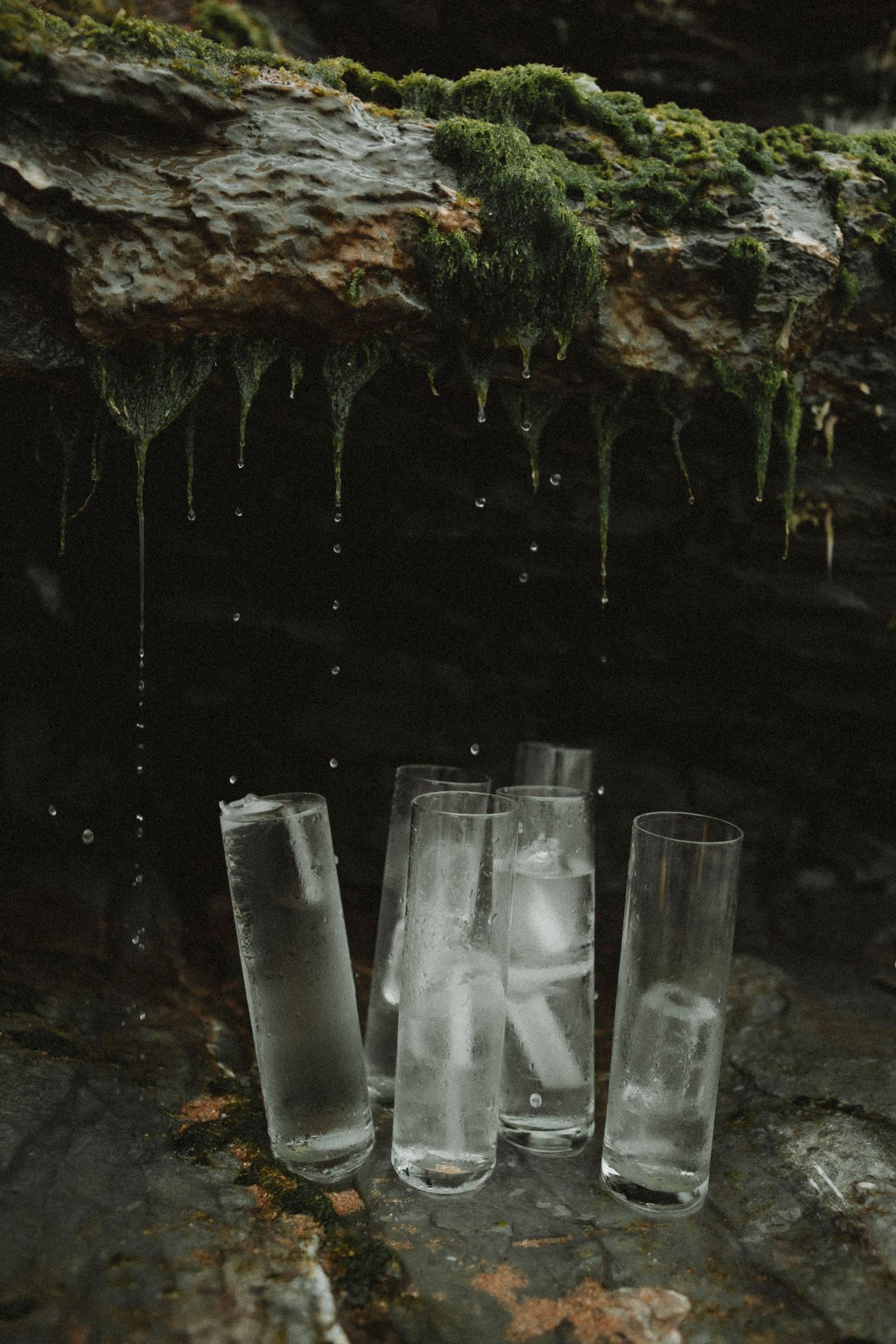- WATER WELLNESS
- Posts
- Wimbledon Dropped Avocados. The EU Dropped Consumer Protection.
Wimbledon Dropped Avocados. The EU Dropped Consumer Protection.
From Centre Court to the cosmetics aisle: Wellness theatre on the world stage (or what we choose to see)
THE WATER METHOD TO WELLNESS
HEY FROM THE SOURCEAround here, water isn’t just something you drink, it’s how you live. Curious. Intentional. Effortless. Less product, more presence. Because if your self-care routine pollutes water, is it really wellness? We’re here to cut through the noise, bust hydration myths, and help you reconnect: with the water in your cells, your watershed, and what truly matters. |  |
If someone forwarded you this email, you can subscribe to get future issues directly in your inbox 💌
Splash of the Week
Your Cell Membrane Has Something to Say
Happy Monday to those who celebrate!
Which headlines did you follow last week? The avocado scandal at Wimbledon or the EU Cosmetics Omnibus?
It’s easy to notice and react to what’s visible.
Avocados disappearing from the Wimbledon menu?
Emotional, symbolic, instagrammable.
A sweeping revision of European chemical regulation?
Quiet. Complex. No visuals. That barely registers.
The World Avocado Organisation (WAO) has responded to Wimbledon’s decision to reduce avocado usage, stating that the move sends the wrong message and perpetuates misconceptions about the fruit’s sustainability.
But I don’t want to debate the sustainability of the avocado today. I believe, the avocado just serves as a viral case study (thanks instagrammable brunch) for a much needed wider discussion on the wellness of our food systems. But not here. Not today. I will keep eating them. Because
Avocados are a hydration staple.
They are a powerhouse of monounsaturated fats, particularly oleic acid, an omega-9 that support more than heart health: they support the integrity of your cell membranes.
Every cell in your body is wrapped in a lipid bilayer. That membrane is a gatekeeper. It decides what comes in, like water, nutrients, and minerals, and what leaves, waste and excess ions. Avocados, thanks to their healthy fats, support membrane health. That means better absorption, better detox, and crucially better hydration at the cellular level.
Because hydration isn’t about how much water you drink. It’s about whether your cells can hold onto it.
Meanwhile, in Brussels
While we were debating whether mashed peas could replace guacamole at Wimbledon, the European Commission was advancing a proposal that could allow known carcinogens to remain in skincare products under the rationale that “low exposure” is acceptable if no safer alternative exists.
The proposed change is part of a regulatory shift labeled “simplification.” The goal? Reduce red tape, save companies money, and make EU law more “competitive.”
Simplification, in this case, means a shift from a hazard-based system, if a chemical is carcinogenic, it’s banned, to a risk-based one. if the dose is small and it’s used as directed, it is fine.
This opens the door for chemicals that were once classified as too dangerous to use, substances that damage DNA, impair fertility, or cause cancer, to legally stay in your 12-step skincare routine.
As long as you don’t eat it. Or use too much. Or mix it with other products. Or wash it down the drain into the local water supply.
Cosmetics: The Invisible Load
Here’s the thing: we don’t use cosmetics once a year. We use them daily, often several times a day. And they don’t just sit on our skin. Many absorb. All of them wash off eventually. Into the water system. Into aquatic life. Back to us.
In fact, up to 92% of the toxic load in EU wastewater comes from pharmaceuticals and personal care products. What pollutes our water isn't just plastic straws or microbeads. It’s creams, cleansers, conditioners, and pills.
Right now, if a chemical is classified as a CMR (carcinogenic, mutagenic, or toxic to reproduction), it’s banned in EU cosmetics unless no safer alternative exists. That’s a precautionary principle. Protect first, ask questions later.
The proposed shift allows these same chemicals to be used if they’re “safe enough” based on expected use.
But what about “actual use”? This is where regulation might get dangerously disconnected from real-world behaviour.
To be fair, the EU has simultaneously adopted Regulation (EU) 2025/877, banning over 20 harmful substances from cosmetics starting in September 2025. This includes pesticides and bisphenol derivatives.
So it’s not black and white. Some progress is happening. But while one hand tightens safety, the other loosens it. And it is hard to follow and understand what this means for our daily product layering and wash & flush practices.
What You Can Do
Let’s be honest, most of us don’t have the time or energy to sit on the floor of Boots or dm for 20 minutes scanning labels, googling ingredients, and cross-referencing chemical safety reports with ChatGPT. And we shouldn’t have to. Even experts don’t know how to choose the best product in the cosmetics or cleaning product aisle.
But we can invest time in finding and supporting brands that do that work for us: the ones committed to transparency and integrity. Here’s where to start:
Shift your focus from products to principles. Look for brands that build with intention: not just clean aesthetics, but clean supply chains, short ingredient lists, and accountability.
Buy less, but better. A smaller, simpler routine can mean less exposure, less waste, and more space to actually listen to your body. Fewer products, more presence.
Dispose of products and medicines responsibly. We are overusing soap. Less is more. In many places, medications should be thrown in the trash (not flushed), because they’ll be incinerated, but always check local guidelines.
Remember: you have agency. Not just in what you buy, but in what you believe. The most radical shift might not be in your bathroom cabinet, it’s in how you understand your body, your mind, your environment, and your power to change what you think and how you show up every day.
Sustainability isn’t about guilt. It’s about connection. About splash and play. One practice at a time.
— Clouds
The Essentials
YOUR HYDRATION EDIT
Each edition, we handpick stories, trends, and insights that connect with our Water Method philosophy. From the source of your water to how you move, restore, and live around it—plus the latest in wellness real estate.
EU ROLLS BACK PROTECTION AGAINST HARMFUL CHEMICALSWe can't trust all wellness to come from our skincare. | AVOCADO BAN AT WIMBLEDONEvery choice has an environmental cost. |
CLEAN BEAUTY CANCELLED?Why you shouldn’t eat your skincare. Or wash and flush it into our waterways. | HOSPITALITY’S NEW LUXURY: PREPAREDNESSHotels are now graded by their ability to withstand wildefires, floods and blackouts. Water security. Not just Eco-Labels and great views. |
☁ Visionary Voices
FRESHNESS AND INTEGRITY OVER EVERYTHING
Before "clean beauty" was a hashtag, Andreas Wilfinger and Ulla Wannemacher were already rewriting the cosmetic industry’s rulebook. Their idea was simple: Only use what the product truly needs. Nothing more. But the result? Potent formulas that kept breaking down.
The problem?
Without synthetic preservatives, the products weren’t stable. They’ve decided to produce fresh. They embraced what no one else dared to at the time: fresh production, short shelf lives, direct shipping. As the products don’t meet shelf life requirements, they could not be stocked in stores. Retailers didn’t want it.
Their motivation? Their son came home from school with a toothpaste gift from the “tooth fairy.” When they checked the ingredients, alarm bells rang. And that moment of concern became the beginning of a movement. RINGANA chose freshness then and is staying true to their original ambition. They didn’t just build a skincare brand, they built a new standard. That was 1996 and it still defines RINGANA today.
No synthetic preservatives
Real expiration dates, not vague “12M after opening” icons
Pure, plant-based ingredients delivered fresh
Why I Choose Brands Like RINGANA and We Are Dip
I was not too keen to promote products, but I often get asked: “Clouds, what do you use at home?”
I have been doing research into this for several years now and I keep learning every day.
But why brands like We Are Dip (dishwasher sheets), built by Charlie Macdonell or RINGANA resonate: They’re not just selling a product, they’re building a movement. One that says: we can do better. Let’s try. One that does not only sell a product, but wants you to understand why it matters.
I’m always curious: What products or brands have truly convinced you. And why?
Hit reply and tell me what you’ve found, what you trust, and how you made the choice.
I read every message.
The Playbook Edit
WAIORA RITUALS
Hydration is where that water goes in your body. You carry two types of water:
Intracellular Water (ICW) lives inside your cells, fueling energy, metabolism, and nutrient flow. When ICW is low, you feel cellular dehydration first: think dull skin, fatigue, and slow recovery.
Extracellular Water (ECW) is outside your cells, in blood, lymph, and tissues. It helps clear waste and regulate temperature. Too much ECW can make you feel bloated or sluggish.
How it’s measured: Bioelectrical Impedance Analysis (BIA) sends a safe electrical signal through your body to estimate ICW and ECW. The InBody 500 machine at your gym is an advanced BIA device that gives you a snapshot of your hydration and body composition.
The Ritual: Focus on quality hydration. Hydrating foods, not just plain water. Move your body daily to support lymph flow protect your cell membranes. #eatyourwater #thewatermethd
Bonus tip (You know this one): You’re most dehydrated in the morning, especially when you sleep with your mouth open. Start your day with a glass of water to kickstart system.
Want to learn more? Read more here
Remember: Don’t obsess over numbers. Instead, learn to listen to your body again: thirst, skin feel, energy levels, and urine colour are your best hydration signals. Follow timeless principles and simple rituals to stay in flow.
A Final Note
NOTES FROM THE MEADOW

Port Meadow, Oxford.
"Don’t explain your philosophy. Embody it."
Current Picks
NEWSLETTERS I AM READING
|
Founder of Beehiiv, Tyler Denk doesn’t just build beehiiv, he builds in public. I love Big Desk Energy because it’s honest, great story telling, and full of real-time insights about what it actually takes to grow something from the ground up. If you’re into the behind-the-scenes of beehiiv or just want a dose of unfiltered entrepreneurial clarity, this one’s for you.
Landed here by chance? Stick around — we make hydrating way more fun. Hit subscribe.
Until next time! ☁
Disclaimer: This newsletter does not provide medical or nutritional advice. The content shared here is for informational and educational purposes only. To inspire a more mindful and empowered relationship with water, and yourself.
